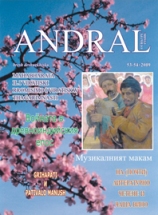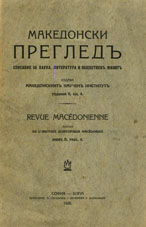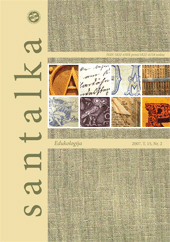


Review / L. Miletitch , The Macedonian Question Congress of the International Union for the League of Nations (London- Aberswight, 25 June - 4. July 1926) Sofia, 8, 31
More...
Review
More...
Review
More...
Review
More...
Review
More...
Review / La Macédoine sous la domination serbe et les droits des minorités (Edition du Comité nationale de l'union des organisations des émigrés macédoniens en Bulgarie). Sofia, 1926, 8°, 3
More...




Review
More...

Review / P. Gabe, La question de la Dobroudja dans son essence. (A propos de l'expropriation des terres de la population locale faite par la législation roumaine). Sofia, 1925, мал. 8°, 96
More...
Keywords: loanwords; international words; ratings; origin of loanword; origin of international word; non-recommendable barbarisms; barbarisms to be avoided.
In 2005, a book “Language Advice (4). Lexis. Usage of Loanwords” was published. It contains a list of loanwords of different fields discussed by the State Commission of the Lithuanian Language. In addition to each loanword, a rating is indicated. The article discusses how the loanwords of business, economic and transport fields are treated in this publication. The study showed that the majority of new business and economical loanwords are derived from the English language. The majority of them are assessed as non-recommendable barbarisms. The majority of international words of this field consist of the Latin origin words. In the transport field there is a great number of Slavic origin loanwords. They are also included into the list discussed and are assessed as non-recommendable barbarisms. Here, there are much less new loanwords than in the business and economic fields. International terms of the transport field are more diverse origin-wise than the terms used in business and economic field. The majority of international words of this field derive from the French and English languages.
More...
Keywords: linguistic competence; linguistic expression; linguistic abilities
This publication provides an analysis of linguistic expression of scientific ideas by professors teaching different specialties at universities of a technical profile (Kaunas University of Technology and Vilnius Gediminas Technical University). The purpose of the investigation is to analyze peculiarities in the linguistic expression of scientific ideas by professors teaching specialty at the universities of a technical profile and its educational effect on the students’ language. The object of the study: language of the professors as an educational factor. The investigational object is analyzed from the aspect of the students’ attitude. Methods of the study: poll in the form of questionnaires and statistical analysis. In total, 622 students studying in the 1st year of under-graduate studies and those pursuing postgraduate studies for a Master’s degree were questioned: 390 from Kaunas University of Technology and 232 from Vilnius Gediminas Technical University. After generalization of the analysis results of the linguistic expression of scientific ideas by professors teaching specialty, it is obvious that the linguistic competence of the professors teaching specialty is an insufficiently effective linguistic factor. In addition, it became clear that linguistic abilities of the professors teaching specialty influenced the students’ attitude to the academic linguistic environment, the respondents’ interest in publications about language culture and terminology and affected the progress in studies of language culture. After summing up of the investigational results pertaining to the personality and the educational abilities of a professor of language culture, it is possible to assert that the respondents consider the professional competence and the high requirement level for the own language as the main criteria for a professor of language culture.
More...
Keywords: teaching control; functions and kinds of control; means of control; requirements of control; ways of control.
The same structure is characteristic to the language learning process as well as to every activity. It consists of: 1) the purpose on the basis of motivation; 2) fulfilment; 3) control on the basis of feedback. The article presents the problems connected with the teaching process control. Some kinds of control are described. The objects of control should be definite speech items (lexis, morphology, syntax, phonetics) and all four speech activities. The degree of skills development is the index of student’s speech competence.
More...
Keywords: terminology; vocabulary; language of educatinal books.
Good knowledge of one‘s mother tongue is the feature of a cultured man. However, to introduce language into the process of cultural development of the future engineer efficiently will be possible only if this connection is grasped by those who organize and determine the system of training and education of students.As one may notice the language of educational or teaching publications under discussion is not always good enough: there are inaccurate uses of terms, vocabulary, grammar; style mistakes occur.The language of these publications would improve,if: a) authors and editors used standardized and unified terms given in Lithuanian dictionaries of terms; b) did not use translations of meaning or words as well as word combinations in improper meaning; c) avoided verb adverbial or substantival structures which darken the meaning.
More...
Keywords: economic and information terminology; term; coin a term; borrowing (loan); foreign word; usage; pecularity; equivalent.
The article investigates the pecularities of economic and information terminology and concludes their original source. As economic terms turn out to have appeared earlier than those of information, so the beginning of the emergence of them was influenced by the Greek and Latin languages. During the Soviet period economic terms were under the influence of the Russian language. A lot of information terms originated from the English language so the dominance of this language is still greatly felt. The common language can be considered to be the original source of some of the mentioned terminology when expanding the meaning of adequate terms. Translation of some of the terms creates problems related to the synonymous meaning of the terms or certain variations of the vocabulary meanings.
More...
Keywords: learning languages; Lithuanian as a second language; communicative methodic.
One of the strengths of European countries is their multilingual nature. That was stressed by the European Council during different international projects. Every citizen of Europe should be given the opportunity to learn languages life long, as languages open new perspectives in the modern world. Besides, learning languages brings tolerance and understanding to people from differentcultures.The article presents the idea, based on the experience of foreign language teaching, that communicative method in learning languages should be applied also to Lithuanian as a foreign language teaching.According to international SOCRATES exchange programme, every year a lot of students and teachers from abroad come to Lithuanian Higher Schools (VGTU included). They should also be provided with opportunities to gain the best language learning, cultural and educational experience. Most of the students that came to VGTU pointed out Lithuanian language learning being one of the subjects to be chosen. That leads to organizing interesting and useful short-lasting Lithuanian language courses. The survey carried in VGTU and the analysis of the materials gathered leads to the conclusion that the communicative approach in language teaching is the best to cater the needs and interests of the learners to master the survival Lithuanian.
More...